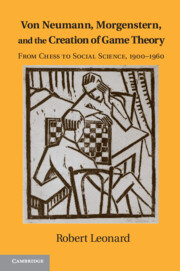Book contents
- Frontmatter
- Contents
- Acknowledgments
- Von Neumann, Morgenstern, and the Creation of Game Theory
- Introduction
- Part One Struggle and Equilibrium: from Lasker to von Neumann
- Part Two Oskar Morgenstern and Interwar Vienna
- 5 Equilibrium on Trial
- 6 Wrestling with Complexity
- 7 Ethics and the Excluded Middle
- 8 From Austroliberalism to Anschluss
- Part Three From War to Cold War
- Bibliography
- Index
- Plate section
6 - Wrestling with Complexity
Wirtschaftsprognose and Beyond
Published online by Cambridge University Press: 05 December 2013
- Frontmatter
- Contents
- Acknowledgments
- Von Neumann, Morgenstern, and the Creation of Game Theory
- Introduction
- Part One Struggle and Equilibrium: from Lasker to von Neumann
- Part Two Oskar Morgenstern and Interwar Vienna
- 5 Equilibrium on Trial
- 6 Wrestling with Complexity
- 7 Ethics and the Excluded Middle
- 8 From Austroliberalism to Anschluss
- Part Three From War to Cold War
- Bibliography
- Index
- Plate section
Summary
Again Holmes would have calculated that, and therefore would have chosen Dover. Thus, Moriarty would have acted differently. And from so much thinking, there would have come no action, or the less intelligent one would have handed himself to the other at Victoria Station because all the fleeing would have been unnecessary. Examples of that kind could be taken from everywhere. Chess, strategy, etc.
Morgenstern, Wirtschaftsprognose, 1928, pp. 98–99Rockefeller Years
When Morgenstern entered the University of Vienna, the Laura Spelman Rockefeller Memorial had been in existence for several years. Named after John D. Rockefeller's widow, its endowment ran more than $70 million and it had become the main source of Rockefeller support for the social sciences before being absorbed into the Rockefeller Foundation in 1929. The Memorial's favourable disposition towards social science research during the 1920s was attributable largely to its director, Beardsley Ruml. He arrived at Rockefeller with a doctorate in experimental psychology from the University of Chicago and was interested in the construction of a less “abstract and remote” social science that would be of immediate use to the “social engineer”.
Ruml established a system of grants, placing emphasis on empirical research and preferring universities that also emphasised teaching. In the United States, the universities of Chicago, Harvard, Columbia, and Iowa State, and the National Bureau of Economic Research were amongst the main beneficiaries. In England, money was given initially to the London School of Economics and later to Oxford. The Cambridge of Keynes and Robinson, on the other hand, showed little interest in shifting focus in response to Rockefeller, and was passed over. In Continental Europe, Rockefeller tended not to support universities directly, in the belief that European social science was still highly speculative, the universities were often torn by internecine strife, and the risks of wasting money through bureaucracy were high. Consequently, the Foundation devoted its efforts to a programme of fellowships intended to free future teachers “from the traditional conceptual thinking and a priori generalizations of the present generation of teachers” and to the funding of institutions that were independent of universities.
- Type
- Chapter
- Information
- Von Neumann, Morgenstern, and the Creation of Game TheoryFrom Chess to Social Science, 1900–1960, pp. 93 - 109Publisher: Cambridge University PressPrint publication year: 2010

